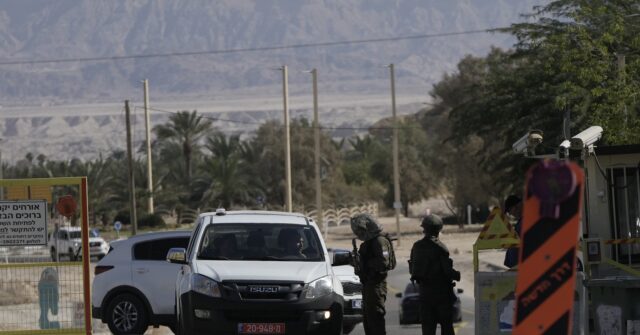On Friday, the Israel Defense Forces (IDF) engaged in a lethal confrontation with two Palestinian terrorists who crossed into Israel from Jordan, disguised in Jordanian military uniforms. This incursion occurred near the Dead Sea region around Neot Kikar, where an observation soldier spotted the attackers cutting through the border fence with a wirecutter. In response, the IDF was alerted to the infiltration using a specific code word, “Parash Turki,” indicating that an unauthorized entry had occurred. As the situation unfolded, the terrorists armed with Glock pistols opened fire, injuring two Israeli soldiers—one with a light injury to the leg and the other sustaining a moderate injury to the buttocks.
The IDF swiftly mobilized forces in the area, launching ground and aerial searches to locate any additional terrorists who might have escaped. A police helicopter was deployed to assist in scouting the vicinity and ensure the safety of the region following the firefight. According to reports, the terrorists were successfully neutralized during the exchange; one was shot about 30 yards from an IDF jeep, while the other managed to reach the vehicle but succumbed to the gunfire on its hood.
This incident exemplifies the heightened tensions and security challenges currently faced by the IDF in the region. With ongoing conflicts in the Middle East, security personnel remain vigilant for potential infiltrations and attacks that threaten Israeli citizens. The use of military uniforms by the terrorists further complicates the already fraught situation and adds a layer of deception that security forces must navigate in the line of duty. The IDF’s rapid response highlights their commitment to preventing breaches of national security and protecting their ranks from harm.
Coverage of the incident by regional news outlets brings attention to the risks Ukrainian soldiers faces daily due to ongoing hostilities and the necessity for any military organization to maintain high alertness at the borders. Incidents like this one serve as stark reminders of the delicate balance of power in the area and the importance of readiness among military personnel.
In the aftermath of this confrontation, discussions regarding the broader implications for Israeli national security are likely to intensify. Analysts may examine the motivations behind such terrorist actions and assess the effectiveness of current security measures along the borders with neighboring nations. Furthermore, the incident raises questions about the use of uniforms by non-state actors—an increasingly concerning tactic that blurs lines and raises security alarms in conflict zones globally.
As Israel continues to address the complexities of security threats, incidents like the one on Friday signify ongoing challenges in maintaining peace and safety in the region. The IDF’s proactive engagement in combat, even under such violent conditions, is indicative of the broader military strategies employed to counter ever-evolving threats. The situation also underscores the importance of international cooperation and relationships in combating terrorism and maintaining stability in the region, especially near border areas where such incidents flash tensions and have confirming repercussions on overall peace efforts.

